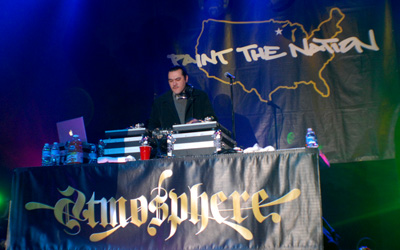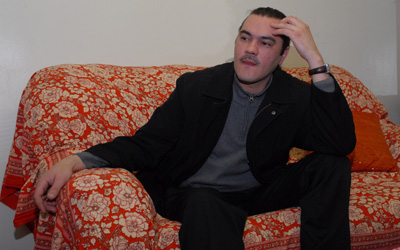
Ant (of Atmosphere)
Chris Catania
The relationship between the DJ and the emcee has always been one of hip hop’s give and takes. How they balance the respect and create the chemistry between them can make the music legendary. But when the emcee thinks he no longer needs his DJ or vice versa, the relationship – and the music – goes sour. Despite the lemony title of their fifth and latest studio album When Life Gives You Lemons, You Paint That Shit Gold, since forming circa 1995, the Minneapolis hip hop duo Atmosphere hasn’t compromised their chemistry. The beats and rhymes have never sounded sweeter.

Knowing that the spotlight usually shines on emcee Sean Daley (aka Slug), I knew I was getting a rare opportunity, before their sold-out Chicago show, to talk with DJ/ producer Anthony Davis (aka Ant). Walking into the backstage room underneath the Vic Theatre, I sense his nervousness as he shakes my hand, telling me that interviews “are not usually his thing.”
Once we do get talking about what Davis loves to do, his nerves settle down. Sipping a beer, he explains how the new album took him in a new direction, allowing the duo to explore a songwriting process completely different from previous albums.
From vintage Atmosphere albums like You Can’t Imagine How Much Fun We’re Having in 2005 to their debut Overcast in 1997, Davis explains the details behind his evolution as producer, songwriting partner, and co-owner of Rhymesayers, an independent label that he, Daley, and a few others started in 1995. Little did they know that Rhymesayers would play a role in defining independent rap over the last decade. By the end of our conversation I see how pivotal a role Atmosphere has played in spreading a blend of new-school poetic introspection with old-school boom-bap beats and rhymes, a creative alchemy that has inspired both artists and fans alike to embrace hip hop differently in the 21st century.
I was surprised that I was going to be interviewing you since Sean usually does the talking.
Yeah, I don’t normally do these types of things.
Is there a reason why?
I have always been a pretty shy person when it comes to communicating with words or talking with people. I think most DJs are that way. I’ve always had a hard time with words, except when dealing with ego-sick, tripping rappers.
You know how to handle and express yourself with words with those guys.
[smiles] Yes, I do.
There are a lot of ways to enter into hip hop. How did you first discover hip hop and DJing?
I started getting into hip hop when I was 15 back in 1995. I started working with rappers pretty soon after that; but I was just a DJ who put on house parties. Then I started to work with records at my house, trying to make songs. I don’t know why, but all of sudden I felt really comfortable talking to and with rappers.
Do you mean talking through the music to them or actually talking with them?
Both, but mainly through the music. When I need to, I do feel comfortable actually talk to them. I might have always been a shy guy or shy with a lot of things, but I’ve never been shy with music. I’ve always been able to say negative and positive things without fear when I’m talking with music. But that’s the only part of my life that I can do that in. Outside of music, it’s really a struggle for me to communicate.
That’s the beauty of music. You can communicate with it if you need to. You guys started the Rhymesayers label in 1995. How has it changed since then?
We started it out of necessity because it wasn’t like New York or L.A. was trying to hear us anyway, so it was the only real option at the time. I’ve never been involved in the business end of it. Sean has a hand in every single aspect of it. I don’t. I just said “yes” at the beginning because I had no options at the time when it came to starting my own company. In the beginning, it really was never about money because all the money we made on the first records went right back into the company. At that time, I was 25, and I was like “what else am I gonna do?” I didn’t want to do anything else. I just wanted to make some music. I made it a rule, at the start, not to be involved with any business decisions at all. I only wanted to deal with the artists. The rest of the guys were okay with that, so we had a deal, and it’s worked ever since. I was the only producer at that time so I guess it was just luck.
You don’t do a lot of scratching and instead use more live instruments. Was your approach to production different this time because of Slug evolving to a more third person storytelling, lyrical perspective?
The change to live production was a conscious effort because I’ve always wanted to use more instrument and recorded live musicians. We just never had the money to do it. It takes a lot of money to pay the engineers to get the right sounds, and have live musicians play. You can’t get those types of people for free. Especially now. Some people think we’re a big deal and they’re mistaken. I might be able to give them a little something now, but I couldn’t do that before.
Working with Sean has evolved over the years. I still don’t know what all the lyrics mean. But on this album I know every song’s meaning because it was constructed differently, from the ground up. [Sean] would ask me for advice with certain songs. This record is pretty self-explanatory. There’s not a lot of hidden messages in there like he normally does. So building the record with Sean was easy this time. On other records he was so poetic that I couldn’t figure out what he was saying, but to be honest, I didn’t really care that much. I just needed to make it sound like he meant it. When I’m producing I always ask myself “does this music fit with what Sean is trying to say? Does the production elevate the song?”
How do you and Sean build songs? Do you listen to Sean’s rhymes first and build beat and melodies around them?
In the past, it was the other way around. I would have him rap over different kinds of music. A song like “Say Hey There,” I know he wrote three different songs to music I gave him. Eventually we agreed that one version was technically sound and the song worked. It’s also vice versa, where Sean will tell me I need to change snares, keep bass line or get rid of the keys. That process has developed over the years. It didn’t start out like that. Every song we’ve made since You Can’t Imagine How Much Fun We’re Having was made like that. But now it’s more collaborative.

The album came with a story book. You and Sean are listed as co-authors. How is it, being a first-time author?
[Chuckles] Funny thing is I didn’t write any of that book. I had really no part in creating it. The only thing I did was proofread it.
What types of corrections did you make?
None really. My job was to make sure it made sense, check to make sure it was funny, or if it was even worth releasing to the public.
Did Sean take any of your suggested proofs?
Nope. And that’s because I don’t think anybody can really fuck with him when it comes to writing.
You’ve mentioned having Jimmy Jam and Terry Lewis’s ’80s sonic inspirations on the new album. It’s a change from your usual straight up funk and boom-bap sound. Were you guys hoping to double dip by paying tribute to your hometown while exploring a new sound?
At first we did. We have songs that were really close to that sound but they never made it out of the studio because they didn’t turn out to be good songs. Again, we started out with that goal, but if you listen to When Life Gives You Lemons, it sounds nothing like Jimmy Jam and Terry Lewis. The sound eventually grew into what you hear on the album. Sean knew from the start that he wanted to tell stories in the Slick Rick style and I knew what sound I was looking for, so we met somewhere in the middle.
Would you say because this album is more storytelling that your production process was a lot different from previous albums?
Yes, it is. That’s because I was able to see the whole process from start to finish. I understood Sean’s writing process the entire time. He went over four bar pieces with me so I understood every word as we went along. I don’t listen to the songs anymore that way, but during recording, I totally saw the vision he had. Making a record that way was different for me because I don’t usually pay attention to the words that much. I used to zone in on more of the sound and technical aspects.
I know you should really just enjoy the moment and soak it in, but what do you guys have planned for the future?
We’re always thinking of crazy shit to do. You throw around a hundred ideas. On this tour we’ve talked about five different ways of doing things next time. What usually happens is that one of those five things ends up happening, but it all combines into one when we make something out of the collaborative mess, just like we did on this album. I have a vision of what I want to do, but who knows if that is going to work?
What’s your vision?
I would like to start getting harp and string players involved because I could pay them now. A lot of times, finances unfortunately do hold you back, but you have to work with what you have until you can work the way you want to.
Like when you’re a DJ just starting out, like you were, and you have to be really creative with your samples and beats and really know your collection and figure out ways to solve problems and make songs with what you have.
Exactly. When you’re a DJ starting out you can’t get anybody to do your shit for you. But slowly and surely, if you keep at it, you start meeting people who can help you.
In the last 15 years, what have you learned about being independent and creating your own label and unique sound?
Patience. You can’t be in a rush to put something out. You also don’t have to sell your record to the first person who comes by. And try not to put just anything out there, thinking that everything you do is great. Sure, we’ve put out some dumb stuff but at the time we didn’t think the music was bad. A lot of artists rush through their music. Now, when I make a song, I let it sit for a month then I go back and comb out all the garbage. I start all over if I have to, but it depends on the song. Make sure you do it right the first time because you might not get another chance. I’ve always felt that every record might be my last so I have to make it count. Hopefully I make a good album one day.
Rhymesayers: http://www.rhymesayers.com/ ◼












